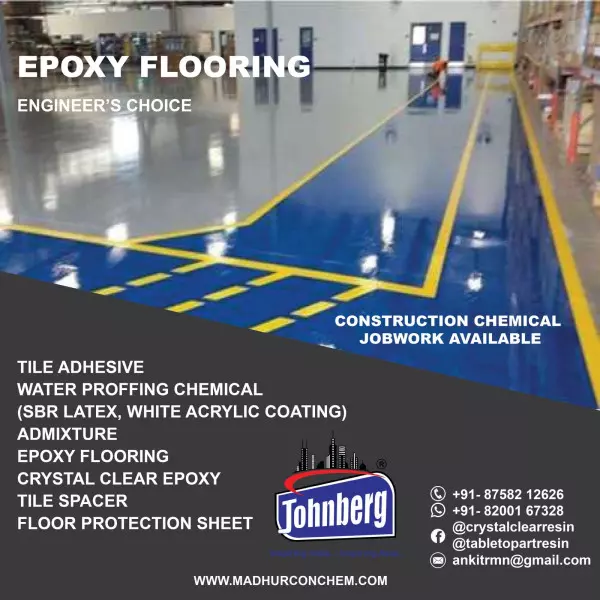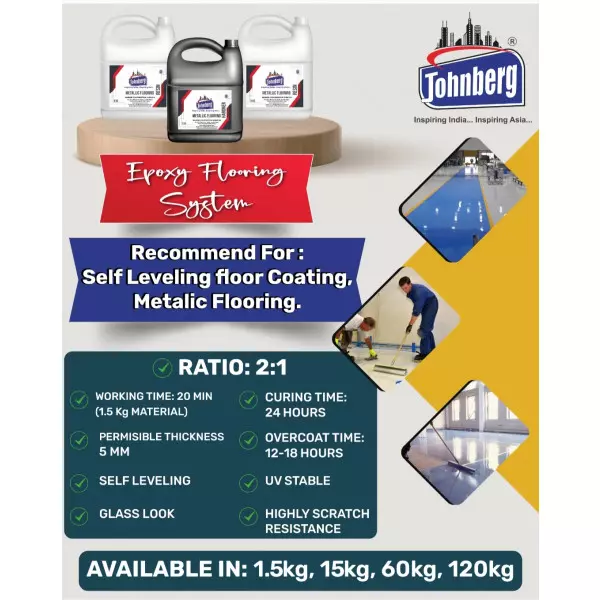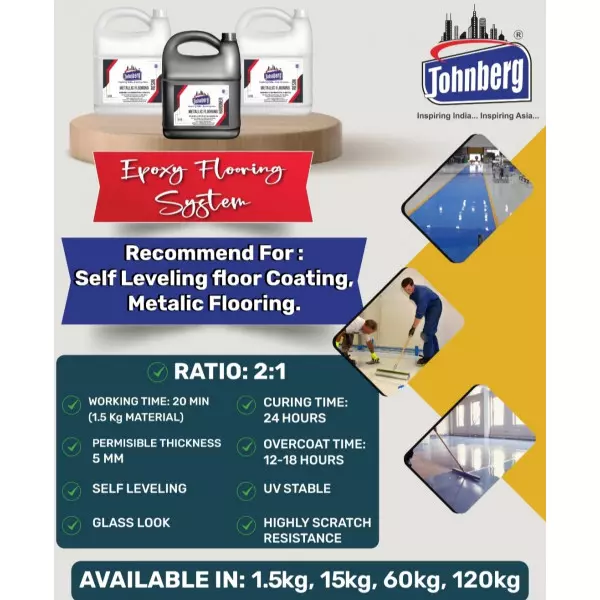- Home
- About Us
- Products
- Resin Furniture
- 3D Epoxy Flooring Service
- Resin Table Top
- Wooden Epoxy Resin Table Top
- Metallic Epoxy Flooring Service
- Conception Chemical Consultants
- Chemical Consultancy For Construction
- Construction Chemical Consultant
- Tile Grout
- Foundation Grout Consultant
- Paver Block Chemical Consultant
- Waterproofing Chemical Consultant
- Epoxy Pigment Consultant
- Heat Reflective Coating
- Water Repellent Coating
- Epoxy Grout
- Chemical Consultant
- Industrial Chemical
- Construction Chemical
- Epoxy Resin
- Epoxy Coating
- Polyester Resin
- Joint Sealants
- Cristal Clear Epoxy Resin And Hardner
- Construction Chemicals
- Polycarboxylate Ether And Liquid
- Solvent Cement
- Tile Protection Sheet
- Water Reducing Superplasticizer
- Epoxy Resin And Hardeners
- Two Component Waterproof Coating
- Epoxy Floor Coatings
- Casting Resin
- Sbr Latex Polymer
- Epoxy Grout Formulations
- Epoxy Resin Tabletops
- Tile Spacers
- Tile Levelling Spacers
- Industrial Night Vision Epoxy Grout
- Sbr Latex
- Johnberg Marble Polishing Liquid
- Acrylic Elastomeric Coating
- Weber Tile Adhesives
- Decorative Arts
- Resinic Crafts
- PU Flexible Tile Adhesive
- Resin Pressed Flowers
- Dry Pressed Flower
- Epoxy Putty
- Resin Furniture
- Services
- Updates
- Gallery
- Contact Us
Epoxy Flooring Coating Service In Tamil Nadu
Details of Epoxy Flooring Coating
Epoxy flooring coating is a highly durable, protective flooring system made from epoxy resins and hardeners. When mixed, these components chemically react to form a rigid plastic material that is strong, resistant to degradation, and bonds extremely well to substrates like concrete.
Key Features of Epoxy Flooring Coating
High Durability
Resists wear and tear from foot and vehicle traffic.
Suitable for industrial, commercial, and residential applications.
Chemical Resistance
Withstands oils, solvents, acids, and other harsh chemicals.
Aesthetic Appeal
Available in a wide range of colors, finishes (glossy, matte, metallic), and decorative flakes or quartz.
Seamless & Hygienic
No joints or seams, making it easy to clean.
Resistant to bacteria and moisture, making it ideal for food, pharmaceutical, and healthcare environments.
Moisture & Stain Resistant
Repels water, oil, and other liquids.
Stains don’t easily penetrate the surface.
Slip Resistance
Can be modified with anti-slip aggregates to improve safety.
Types of Epoxy Flooring Coatings
Type Description Typical Use
Self-Leveling Epoxy Smooths out uneven surfaces Warehouses, kitchens, garages
Quartz-Filled Epoxy Mix of epoxy and colored quartz Restrooms, locker rooms
Epoxy Mortar Strongest, with sand/quartz Heavy-duty industrial use
Anti-Static Epoxy Dissipates static electricity Electronics, labs
Epoxy Flake Coating Decorative flakes for texture and appearance Showrooms, garages
Metallic Epoxy Mixed with metallic pigments for a marble effect Lobbies, retail
Composition
Epoxy Resin (usually Bisphenol A or F)
Hardener (curing agent like amines or anhydrides)
Additives: Thickeners, accelerators, color pigments, anti-slip agents
Aggregates (optional): Quartz, flakes, sand for texture or strength
Installation Process
Surface Preparation
Concrete cleaning, grinding, or shot-blasting
Moisture tests and crack repairs
Primer Application
Enhances adhesion to substrate
Mixing & Applying Epoxy
Usually multiple coats (base, body, and top coat)
Curing Time
Touch dry in 6–12 hours
Fully cured in 5–7 days (depending on type and conditions)
Pros and Cons
Pros:
Long-lasting (10–20 years)
Easy to maintain
Customizable aesthetics
Chemical & abrasion resistant
Cons:
Surface must be properly prepped
Can be slippery if not textured
Not UV stable (can yellow if exposed to sunlight)
Requires professional installation for best results
Common Applications
Industrial: Manufacturing plants, warehouses
Commercial: Malls, hospitals, showrooms
Residential: Garages, basements, kitchens
Offered Product
Epoxy Flooring Coating
BrandJohnbergUsage/ApplicationRollerPackaging Size20 LThicknessUpto 5 MmFully Cured TimeLess Than 24 HourElastic Recover RateMore Than 90 %Elongation At BreakMore Than 800 %Application Temperature5-35 Degree CService Temperature- 40-80 Degree CFlow AbilitySelf-levelingSolid ContentMore Than 80 %Tack Free Time16 HourDensity1.35+/-0.1Gr/ccSkin Dry TimeLess Than 3 HourAppearanceGray, Homogeneous PasteShelf Life6 MonthsMain Raw MaterialEpoxyKey Features:One Component, Very Easy For Application, Free... Read moreEpoxy Flooring Coating Manufacturers In Varanasi
Epoxy Flooring Coating Is A Durable And Highly Customizable Surface Treatment Commonly Used For Industrial, Commercial, And Residential Floors. It’s Made From A Combination Of Epoxy Resin And A Hardener, Which Chemically React To Form A Strong, Plastic-like Material.What Is Epoxy Flooring?Epoxy Flooring Is A Type Of Synthetic Resin Floor System Laid On Top Of Concrete Substrates As A Form Of Protection And Decoration. It Typically Consists Of Multiple Layers Of Epoxy Applied To The Flo Continue
Epoxy Flooring Coating Manufacturers In Lucknow
Epoxy Flooring Coating Is A Highly Durable And Protective Surface Finish Used In Both Commercial And Residential Settings. It’s Created By Mixing A Resin And A Hardener, Which Chemically React To Form A Rigid Plastic Material. Below Are The Details Covering Various Aspects Of Epoxy Flooring:What Is Epoxy Flooring?Epoxy Flooring Is A Type Of Synthetic Resin Floor System Laid On Top Of Concrete Substrates. It’s Made Of:Epoxy Resin (part A)Polyamine Hardener (part B)When Mixed Continue
Epoxy Flooring Resin Manufacturers In Mumbai, India
Epoxy Flooring Resin Is A Type Of Polymer Material Used To Create A Durable And Strong Floor Coating. It Consists Of Two Components A Resin And A Hardener Which When Mixed Together Undergo A Chemical Reaction And Form A Hard Plastic Material. This Flooring Is Known For Its Excellent Adhesion To Surfaces Resistance To Chemicals And Abrasion And Ability To Withstand Heavy Traffic. Epoxy Flooring Resin Is Commonly Used In Industrial Warehouses Commercial Buildings Garages And Even Residential Space Continue




